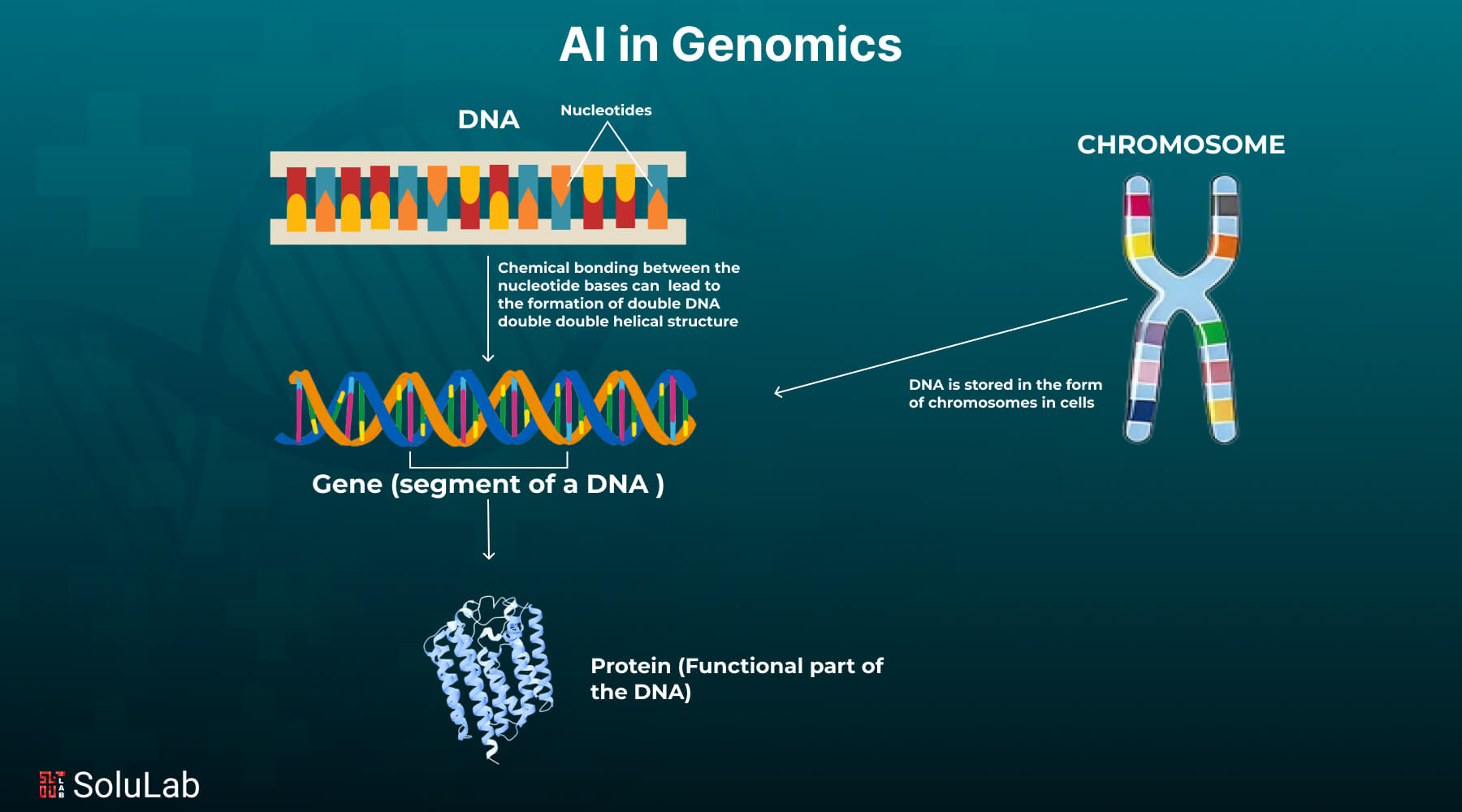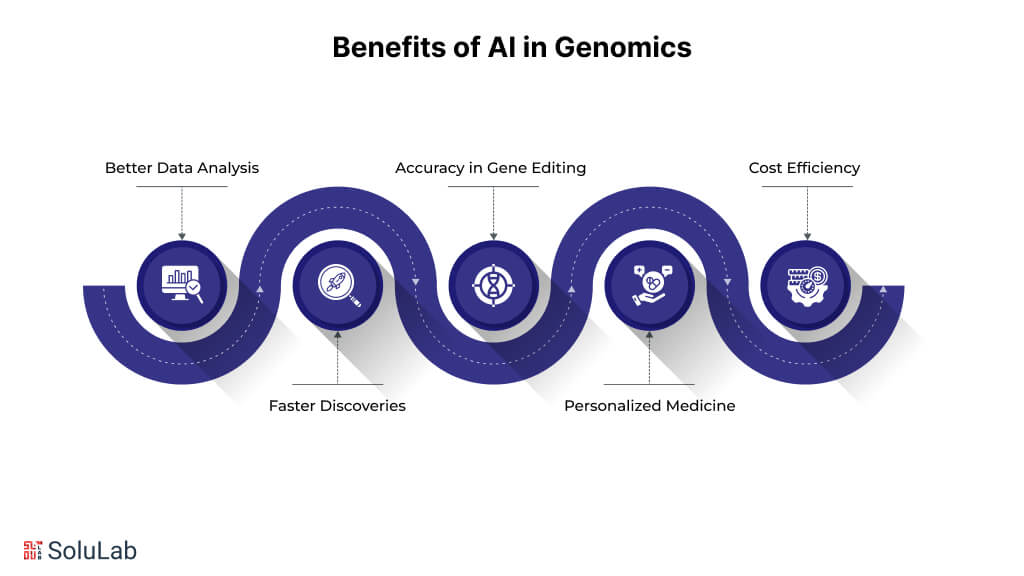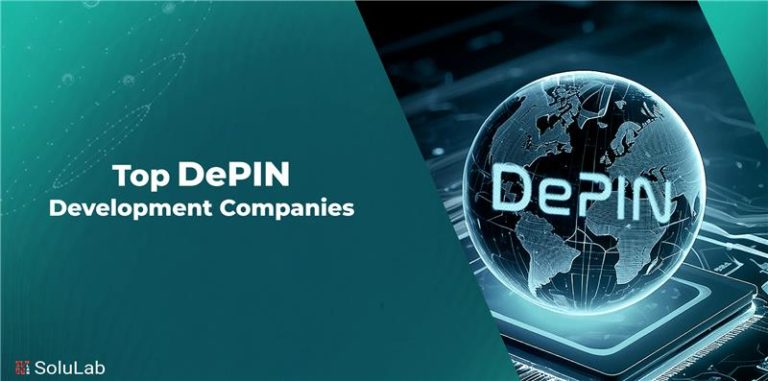
Regarding genomics, artificial intelligence (AI) is useful since it helps researchers analyze enormous volumes of complex genomic data more efficiently and precisely than they were previously able to. As an illustration, the human genome comprises approximately three billion base pairs, and large-scale research can entail the participation of hundreds of thousands of gene sets.
Moreover, artificial intelligence can recognize patterns and correlations in data that are too delicate or complex for people to discover, as well as forecast the effects of particular changes. The global AI in genomics market was worth USD 497.9 million in 2022 and is predicted to grow 46.0% from 2023 to 2030.
The application of generative artificial intelligence has the power to the science of genomics by providing novel tools and methods for comprehending intricate biological data. It is going to become more and more significant as the amount and complexity of genetic data continue to increase, and as the capabilities of AI tools continue to improve. Generative genomics is a relatively recent field of study that emerged as a result of this.
What is AI in Genomics?
Artificial Intelligence in genomics is the art of using complex computer programs for a better understanding of DNA and genes. Imagine a robot that would look at billions of DNA letters that constitute the human genome, and then pinpoint patterns that perhaps we may fail to see. AI enables researchers to quickly process and accurately understand this massive amount of data, with the ability to predict how genes could influence diseases or even propose therapeutic approaches to genetic conditions.
For instance, AI can help identify which gene changes cause cancer, thereby speeding up early detection and personalized treatments. It can also speed up the discovery of new drugs by analyzing genetic data to find possible targets.
In short, AI is crucial for genomics, making research faster and more precise. It allows scientists to dig deeper into genetic information, making it easier to understand health conditions and find better treatments. AI is changing the future of medicine, and the possibilities are endless!
How is AI Used in Genomics?
AI is improving genomics by enabling faster, more accurate, and insightful analysis of genetic data, which helps in understanding complex diseases, developing treatments, and advancing personalized medicine.
1. Machine Learning and Deep Learning
Deep learning (DL) algorithms analyze vast amounts of genomic data, identifying patterns and associations that are difficult for humans to detect. These techniques enhance predictive accuracy for disease risk, treatment response, and genetic disorders, thus advancing precision medicine.
2. Natural Language Processing
Natural Language Processing (NLP) is used to gain valuable insights from unstructured data such as research papers, clinical notes, and genetic databases. It helps identify new gene-disease relationships and literature trends so that researchers can keep up to date and make discoveries in genomics faster.
3. Analysis of Genetic Variation
AI is used to detect and analyze the genetic variants causing diseases. It processes large genomic data sets efficiently and associates genetic mutations with the conditions, leading to better diagnostic results, and new therapeutic targets for most genetic disorders such as cancer and rare diseases.
4. AI in CRISPR and Gene Editing
AI optimizes CRISPR and other gene-editing technologies by predicting the best gene targets and directing edits with more precision. Off-target effects are also assessed by machine learning algorithms to improve the efficiency of gene editing and, therefore, hold the potential for cure of genetic diseases.
5. Integration of Genomic Data
AI algorithms combine different genomic data annotations, such as sequencing, epigenetics, and transcriptomics, to provide a comprehensive view of an individual’s genetic makeup. This integration will support more informed clinical decisions, such as personalized therapies and risk predictions, by providing a holistic understanding of genetic information.
6. AI Enhanced Genomic Sequencing
AI is improving genomic sequencing due to its impact on the speed and precision of interpreting the sequenced DNA. It eliminates errors, highlights rare mutations, and makes analysis processes more efficient hence making genomic sequencing cheaper and more possible for clinical applicability in medicine and disease development.
Use Cases of AI in Genomics
AI in genomics continues to transform because it offers solutions to complex biological problems. Here are some of how AI use cases are deployed in different functionalities of genomics:
1. Functional Genomics
It analyzes gene function by processing large datasets from experiments conducted on the genome. This helps predict gene-disease relationships and identifies key biomarkers, revealing deeper insights into gene regulation and its interactions while enabling better therapeutic strategies and discoveries of drugs.
2. Clinical and Genomic Diagnostics
AI helps diagnose genetic disorders through the analysis of patient genomics data. It aids in identifying mutations and variations in DNA sequences, enabling healthcare professionals to make more accurate diagnoses and tailor treatments for patients with rare genetic diseases.
3. Generative AI in Genomics
Generative AI is used to design new genomes or simulate biological data. Using this approach, researchers can generate synthetic genomes or optimize DNA sequences for specific purposes, such as improving agricultural traits or developing new therapies.
4. Gene Editing
This prediction also assists gene editing technologies such as CRISPR. The AI enables these tools for more precise genome editing, therefore eliminating off-target effects and elevating the overall success rates in gene therapies and personal treatments.
5. Genome Assembly
AI optimizes the process of reassembling DNA fragments into a complete genome. Deep learning algorithms can allow AI to efficiently process large amounts of genomic data and improve the accuracy and efficiency of genome assembly in complex organisms.
6. Epigenetics Research
AI is critical to epigenetics and has enabled researchers to understand how environmental conditions influence gene expression. By studying DNA methylation, histone modification, and other epigenetic markers, AI recognizes patterns that could bring long-awaited solutions to prevent disease and new treatments for disease.
Benefits of AI in Genomics

Here are some benefits of AI in Genomics:
1. Better Data Analysis
Data analysis and modeling are becoming stronger with advanced tools and techniques. All these innovations have made it possible for researchers to understand complicated genetic data, which can facilitate trends, correlations, or other patterns. As a result, one can gain more intelligent decisions, quick breakthroughs, and even predict the outcome with high accuracy.
2. Faster Discoveries
Advancements in technology, especially AI, have significantly accelerated the pace of discoveries in various fields. Scientists can identify key insights quicker by analyzing large datasets more rapidly, reducing the time it takes to bring novel solutions to the market. This speed can ultimately transform industries like healthcare and biotech.
3. Accuracy in Gene Editing
With the tool CRISPR, precision in gene editing has been improved to unprecedented dimensions. The changes in the DNA sequence were highly accurate as the off-target effects were highly minimized. Thus, accuracy has been critical to avoid unintended changes in genetics, thereby producing safer and more effective treatments for genetic diseases.
4. Personalized Medicine
Personalized medicine provides drugs tailored to an individual’s particular type of genetic makeup. It is through the analysis of the information from a person’s genetics that treatment options recommended for the patient are more likely to be effective and minimize unintended side effects. This has resulted in more specific and effective AI in healthcare services.
5. Cost Efficiency
Modern technology has also made medical procedures and treatments more cost-effective. By improving data analysis and precision, unnecessary trials, errors, and hospital visits are reduced. This helps lower healthcare costs, making advanced treatments more accessible to a broader population, while maintaining or improving the quality of care.
Artificial Intelligence in Genomics Market Restraint
A lack of competent AI professionals and a stringent regulatory environment may stymie business growth. As demand for AI grows in a variety of areas, including genomics, the restricted pool of AI experts presents substantial obstacles, impeding industry growth. The intricacy of AI technologies and their use in genomics necessitates a specific skill set, which is currently in limited supply.
This lack impedes the seamless integration of AI into genomics operations, slowing progress in the field. Furthermore, the strict restrictions governing data privacy, security, and ethical issues will impede the acceptance and deployment of AI in genomics.
Based on technology, artificial intelligence in the genomics market is divided into two segments: machine learning and computer vision. The machine learning segment is estimated to generate approximately USD 8.1 billion by 2032. The increasing availability of large-scale genomic information and advances in processing capacity have permitted the use of advanced machine-learning methods in the genomics domain. These algorithms can examine complex genomic data, discover trends, and make predictions. Such benefits linked with machine learning will help the market grow. Furthermore, machine learning allows for the construction of prediction models for disease diagnosis, prognosis, and therapy response, which supports precision medical techniques and boosts market revenue.
The AI application in the genomics market is divided into three functional segments: genome sequencing, gene editing, and others. The genome sequencing segment is estimated to generate around USD 5.6 billion by the end of 2032. The use of AI-powered algorithms for genomic data interpretation improves the ability to find rare genetic variants and uncover key insights that can inform clinical decision-making, ultimately driving market growth.
Furthermore, genome sequencing companies are collaborating with AI technology-based enterprises to speed up the process. PacBio, a sequencing platform company, teamed with Google in January 2022. PacBio expects to use Google’s genomic analysis, machine learning, and algorithm development technologies to improve its existing HiFi sequencing runs, resulting in greater insights from sequencing data.
How AI is Improving the Genomics Industry?
Huge waves in the genomics world! Scientists are beginning to understand our genes in ways that we thought impossible. This is how it all happens:
1. AI-Powered Multi-Omics Integration
AI allows scientists to see many layers of biological data simultaneously, like DNA, RNA, and proteins. It identifies patterns in the layers that help researchers better understand diseases and create new treatments faster.
2. Quantum Computing in Genomic Analysis
Quantum computers have utilized superpower speeds to process enormous amounts of data within just seconds. They help scientists perform genetic analysis quicker, with proper predictions and more discoveries about the genomics behind new cures and treatments.
3. AI to Model Complex Diseases
AI can scan vast amounts of genetic data and work out how diseases work at the DNA level. It helps doctors understand why some people get sick and others do not, which leads to better ways of preventing or treating diseases.
4. AI-Driven Synthetic Biology
It is currently helping scientists design some new biological parts, like cells or proteins, to do specific tasks. This could lead, in the future, to new medicines or maybe even fixing damaged genes, making science even!
Pro Tip: When using AI for due diligence, choose automation tools that integrate with your existing systems. Look for AI agents that can analyze large datasets quickly, flag risks in real time, and reduce human errors. This not only speeds up the process but also ensures more accurate decision-making.
Challenges Confronted When Using AI in Genomics
AI is a strong tool, but using it in genomics has its problems. Here are some of the main challenges scientists face when using AI to study genes:
1. Ethical Issues
In terms of the implementation and use of genomics AI, challenging issues may emerge: For example, who can use personal genetic data? Proper precautions should be applied to guarantee proper AI implementation responsibility, thereby keeping people’s confidentiality and no improper choices based on some genetic basis.
2. Computational Constraint
The sheer volumes of genetic data are computationally expensive for AI. Thus, to analyze them, one would often require strong computers and specialized programs running the AI model. If that were not available, the processing would be very slow and complicated.
3. Data Privacy
There’s always a risk that someone might misuse the AI when handling sensitive genetic data. Keeping personal genetic data safe is highly crucial, but one may find it difficult to have ultimate privacy assurance with AI when information is shared between researchers and companies.
Conclusion
Generative AI could improve genomics research on genetic variety, how mutations affect DNA function, and how to produce customized genetic sequences and cells. This may advance personalized therapy. Researchers will use AI across multi-omics to better comprehend biological processes.
As AI technologies push technological frontiers, research groups must incorporate ethical thought into their design and delivery of research, and governing authorities must address social and ethical concerns. Responsible and explainable AI is crucial for public confidence and tool benefits. With its large-scale data creation and commitment to AI-supported research and ethics.
Solulab helped InfuseNet overcome challenges in AI model integration, intuitive interface design, and data security. By developing a drag-and-drop Flow interface and data import from various sources, InfuseNet enables businesses to create personalized AI applications, boosting productivity and ensuring data privacy throughout the process. SoluLab an AI development company has a team of experts to help you solve your business problems so, contact us today to discuss further.
FAQs
1. What challenges does AI face in genomics?
There are challenges such as ethical issues over data privacy, the computational requirement that is a huge requirement for powerful computers, and how the data itself is correct to avoid biased output.
2. Is AI in genomics safe?
While AI is indeed an incredibly powerful tool, it still needs strict ethics and privacy protocols to ensure responsible use. The protection of data is essential so that genetic information will not be exploited in healthcare application development services.
3. Can AI predict diseases from genes?
Yes, AI can analyze genetic data to predict a person’s risk for certain diseases. It helps doctors understand genetic predispositions to conditions such as cancer, diabetes, and heart disease and gives them an earlier opportunity to intervene accordingly.
4. How accurate is AI in genomics?
AI can be highly accurate when it is trained with large, diverse datasets. However, this depends on the quality of data and algorithms. Researchers are constantly improving these models to give better results.
5. What is the role of AI in personalized medicine?
AI plays a key role in personalized medicine by analyzing a person’s genetic makeup to recommend customized treatments. It helps doctors choose the best medicine or treatment plan based on individual genetic information.






